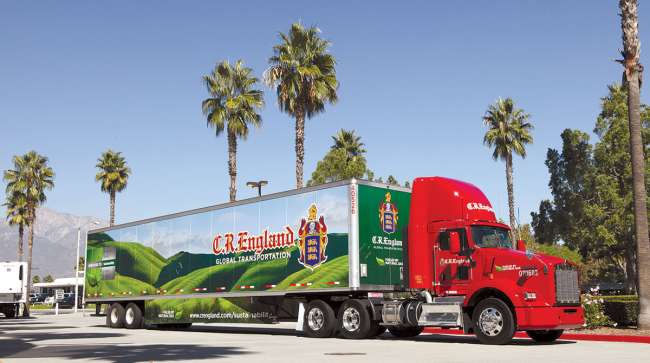Truckload Carriers Raise Rates, Surcharges in Response to New California Taxes

Several truckload carriers are currently negotiating with shippers to add new surcharges or otherwise raise rates to haul freight through California after state lawmakers raised fuel taxes and other fees as of Nov. 1, Transport Topics has learned.
The transportation law — S.B. 1 — raised the diesel fuel excise tax 20 cents per gallon, increased the diesel sales tax from 1.75% to 5.75% and adjusted registration fees based on vehicle values.
Refrigerated carrier C.R. England told TT the law will cost it an additional $3.4 to $3.9 million per year to do business in California, or about 6 to 7 cents per mile.

England
“The problem with the traditional fuel surcharge is that it’s based on national data [from the Energy Information Administration] which dilutes the full impact of the rising California costs for miles traveled in California,” said TJ England, chief legal officer at C.R. England.
The Salt Lake City-based carrier, which ranks No. 26 on the Transport Topics Top 100 list of the largest for-hire carriers in North America, is one of several truckload companies actively discussing pricing with shippers on freight moving through California.
Prime Inc., which ranks No. 18 on the for-hire TT100, is currently “soliciting customers’ support” for a surcharge, according to Vice President Steve Wutke, who pegged the minimum at 4 to 6 cents per mile.
CRST International, No. 19, adjusted rates on about 75% to 80% of its California shippers and negotiations are ongoing with the remaining customers. CRST CEO Dave Rusch told TT that S.B. 1 will add about $2.5 million to $3 million in incremental costs annually, or, like C.R. England, about 6 to 7 cents per mile.

Rusch
Gardner Trucking, a CRST subsidiary, operates almost exclusively in California, while CRST Expedited and CRST Specialized Transportation haul freight in and out of the state.
“About half of our customers wanted an excise tax surcharge applied as a separate line item and the other half wanted us to increase the rates across the board. But we only apply the surcharge on the miles within California. So if we run a load from New York to Los Angeles, we only apply the surcharge to the miles from the state border to Los Angeles and back out,” Rusch said.
U.S. Xpress Enterprises — No. 21 — and Celadon Group — No. 33 — also adjusted rates within their existing pricing formulas.
Crete Carrier Corp. CEO Tonn Ostergard said that most shippers understand that diesel prices are higher in California than the national average, so the costs need to be passed on to the customer. Crete ranks No. 35 on the for-hire TT100.

Ostergard
“You try to use the E.I.A. index as much as you can, but certainly it gets to a point where you have to be market specific. Anytime when you have a special tax such as S.B. 1, it heightens everyone’s awareness,” Ostergard said.
Knight-Swift Transportation Holdings also enacted a separate S.B. 1-related surcharge in California, although the carrier declined to specify the amount. “There are a number of other factors that make California a very expensive place to do business and frankly, we probably absorb a majority of those increases. But this one is pretty black and white and it’s been met with understanding by our customers,” CEO Dave Jackson said.
Other fleets such as Mesilla Valley Transportation and Hirschbach Motor Lines told TT that they haven’t implemented any changes in California yet, but won’t rule out rate adjustments in the future.
For many years, it’s been more expensive to operate in California than in other states on the West Coast. Environmental regulations from the California Air Resources Board and the San Pedro Bay Clean Air Action Plan force commercial fleets to spend cash to comply with the strict standards. There are also expenses tied to the state’s meal and rest break laws, which the trucking industry believes violate the motor carrier exemption in the Federal Aviation Administration Authorization Act of 1994, also known as F4A.
“In fact, the California legislature recently passed a law that outlaws piece rate pay (such as per-mile pay) and mandates paid rest breaks on top of the Department of Transportation required breaks, which raises costs and decreases the productivity of drivers in the state,” England said.
According to a 2014 study from Hiscox, an international insurer, a California business with more than 10 employees has a 17.75% chance of being sued by an employee, or 42% higher than the national average.
C.R. England estimates these costs amount to an extra $7.4 million to $8 million per year in compliance expenses, or 15 to 16 cents per mile, on top of the total tied to S.B. 1. The company declined to specify the amount of its new surcharge, but said it was inclusive of all of the financial considerations in California.
In a statement, Werner Enterprises CEO Derek Leathers declined to specify whether his carrier — No. 16 — will add a new fee tied to S.B. 1, but acknowledged that customers pay more in states where the cost to do business is higher.
“As it pertains to California, the higher cost of doing business includes regulatory challenges, wage and hour rules, taxes, and environmental issues, not to mention the number of lawsuits and class actions that companies have to endure when trying to do business in the state,” he said.
In neighboring Oregon, Governor Kate Brown signed a bill into law that raises fuel taxes 4 cents per gallon on Jan. 1 and increases the weight fee on trucks from $16.38 cents per mile to an estimated $25.12 per mile by 2025.
Greg Hirsch, Daseke’s senior vice president, said that “if a California load is [moved] inbound or outbound through Oregon, the increase will be a double pass through.” Daseke is No. 42 on the for-hire TT100.
Jackson said that Knight will incorporate extra costs to operate in Oregon into its overall pricing.
Less-than-truckload carriers already include a “California surcharge” in their tariffs, on average between $6.00 to $10.00 per shipment. Fleets such as XPO Logistics, Estes Express Lines and Daylight Transport, among others, have raised their tariffs recently due to the fuel tax hikes.




